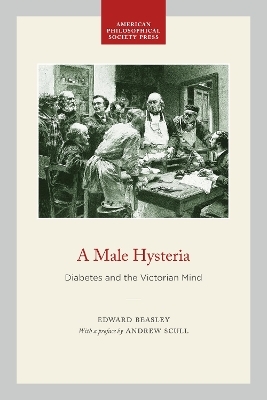
A Male Hysteria
University of Pennsylvania Press (Verlag)
978-1-60618-900-9 (ISBN)
- Lieferbar (Termin unbekannt)
- Versandkostenfrei innerhalb Deutschlands
- Auch auf Rechnung
- Verfügbarkeit in der Filiale vor Ort prüfen
- Artikel merken
A Male Hysteria examines both the science of diabetes in nineteenth-century England and the testimony of Victorian diabetics. What could be known about diabetes given the science of the day? And what did new models of diabetes mean for the treatment and self-image of diabetics?
Ideas about diabetes were revolutionized in 1849 by the great French physiologist Claude Bernard. After he made rabbits diabetic by pricking their brains, diabetes in England came to be thought of as neurological, even psychological in origin. British diabetics (often men) were prevented from working or becoming excited, treated in the same manner as women who were diagnosed with hysteria. Meanwhile, discoveries in thermodynamics were applied to diabetics and menstruating women. People were assumed to be closed systems, wasting energy that couldn't be replenished. Thus, diabetics had to stay still if they wanted to live and women had to stay away from education to have the energy to produce children.
Some people resisted these hysterical views. As no brain lesion was ever found in deceased diabetics, even after decades of searching, the animal model of the disease no longer seemed to apply to humans. Some diabetic patients also resisted the hysterical picture, including medical professionals—both men and women—who refused to slow down as the new treatment regimen was mandated. Likewise, physicians at spas noted that walking long distances seemed to help diabetics.
A Male Hysteria journeys through nineteenth-century diabetes science and the lives of diabetics. It examines how science can go wrong when models from one area of inquiry are too excitedly applied to another. It also demonstrates the persistence of the psychological stereotype of diabetics as nervous and overworked in the United Kingdom—long after medical attention turned to the pancreas and the role of insulin.
Edward Beasley is Professor Emeritus of History at San Diego State University. He is the author of several books on how people thought about empire and race in nineteenth-century England, including The Victorian Reinvention of Race: New Racisms and the Problem of Grouping in the Human Sciences (2010) and The Chartist General: Charles James Napier, The Conquest of Sind, and Imperial Liberalism (2017). He lives in Baltimore, Maryland. Andrew Scull is Professor Emeritus of Sociology at the University of California San Diego, and one of the world's foremost historians of medicine.
Contents
Abbreviations
Preface Diabetes Then and Now by Andrew Scull
Chapter 1. Introduction
Chapter 2. Diabetes Before Bernard
Chapter 3. Bernard’s Revolution and the Diabetes of the Brain
Chapter 4. Diabetes and Medical Science after Bernard
Chapter 5. Robert Saundby’s Statistical and Clinical Response
Chapter 6. Hysteria and Henry Maudsley
Chapter 7. The Cultural Context
Chapter 8. The Lives Affected: Diabetes in the DNB
Chapter 9. Diabetes at the Spa
Chapter 10. From the Brain to the Pancreas
Chapter 11. Insulin and After
Chapter 12. Conclusion
| Erscheinungsdatum | 04.07.2024 |
|---|---|
| Zusatzinfo | 4 images, B&W |
| Verlagsort | Pennsylvania |
| Sprache | englisch |
| Maße | 152 x 229 mm |
| Themenwelt | Studium ► Querschnittsbereiche ► Geschichte / Ethik der Medizin |
| Sozialwissenschaften ► Soziologie ► Gender Studies | |
| ISBN-10 | 1-60618-900-X / 160618900X |
| ISBN-13 | 978-1-60618-900-9 / 9781606189009 |
| Zustand | Neuware |
| Haben Sie eine Frage zum Produkt? |
aus dem Bereich


